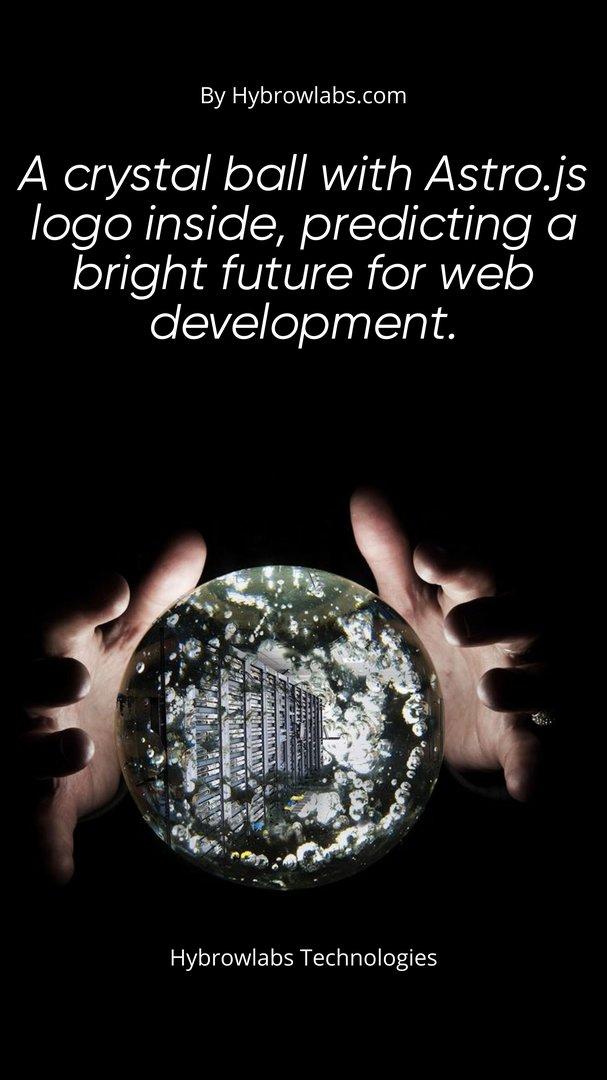The world of web development is constantly evolving, & static site generators (SSGs) are becoming an increasingly popular choice for developers. SSGs are a new approach to building websites that provide a faster, more secure, & simpler development process than traditional content management systems (CMSs).

This article will provide a comprehensive overview of why static site generators are the future of web-based development & how they can be used to create fast, secure, & easy-to-maintain websites. Whether you are a developer looking to switch to SSGs or a business owner looking to improve your website's performance, this article will provide valuable insights into the benefits of using SSGs.
What are Static Site Generators?
Static site generators are a new approach to website development that generates web pages as static HTML files. Unlike traditional dynamic content management systems (CMSs) like WordPress or Joomla, static site generators do not rely on server-side processing to generate pages. Instead, they build websites from pre-existing templates & content stored in files.
Getting Started with Astro.js:

To get started with Astro.js, we will need to install Node.js, a JavaScript runtime environment that allows us to run JavaScript code outside of a web browser. Once we have installed Node.js, we can install Astro.js using the following command:
npm install -g astro
Next, we can create a new Astro.js project using the following command:
astro create mywebsite
This will create a new Astro.js project in a folder called "mywebsite". We can then navigate to this folder & start the development server using the following command:
cd mywebsite astro dev
This will start the development server & open the website in our default web browser. We can then make changes to the website & see them reflected in real-time.
Creating a Simple Website with Astro.js:
To create a simple website with Astro.js, we can start by modifying the default homepage. We can open the file "src/pages/index.astro" & make changes to the content. Astro.js uses a special syntax called "Astro" to define the structure & content of the website. For example, we can add a heading to the homepage using the following code:
<astro><h1>Hello, world!</h1> </astro>
We can also create a new page by creating a new file in the "src/pages" folder. For example, we can create a new page called "about.astro" using the following command:
touch src/pago
We can then add content to this page using the same syntax as before. For example, we can add a heading & some text to the About page using the following code:
<astro><h1>About Us</h1><p>We are a small web development company based in San Francisco.</p> </astro>
Discovering the Benefits of Static Site Generators with Astro.js:

Static site generators have gained popularity in recent years as an alternative to traditional content management systems. Astro.js is a static site generator that has emerged as a popular choice due to its powerful features & ease of use. Here are some benefits of using Astro.js for building static sites:
1. Improved Performance:
Static sites generated by Astro.js can load faster than dynamic sites as they do not need to generate content on the fly. Instead, they are pre-built & delivered to the user's browser as HTML, CSS, & JavaScript files. This can result in a better user experience & improved SEO performance.
2. Enhanced Security:
With no database to hack or server-side scripting languages to exploit, static sites generated by Astro.js are less vulnerable to security breaches. This reduces the risk of cyber-attacks & protects sensitive data.
3. Simplified Development Process:
Astro.js provides developers with a simple & efficient development process. Its modular architecture allows developers to easily create reusable components, enabling them to build websites faster.
4. Greater Control:
Astro.js enables developers to have complete control over the generated HTML, CSS, & JavaScript. This means they can optimize the site's performance, improve accessibility, & create a more customized user experience.
5. Scalability:
Astro.js generates sites that are highly scalable & can handle high traffic. Since the sites are pre-built, there is no need for additional server resources, allowing for faster & more efficient scaling.
6. Flexibility:
Astro.js offers developers flexibility in choosing their preferred front-end framework, such as React or Vue.js. This allows developers to leverage their existing skills & build robust applications quickly.
7. Cost-Effective:
Building a static site with Astro.js can be more cost-effective than building a dynamic site. Since there is no need for a database or server-side scripting, the development costs & ongoing maintenance expenses are reduced.
Comparing Astro.js with Other Popular Static Site Generators:

Astro.js is a powerful & flexible static site generator that offers several advantages over other popular static site generators. While it may not be the best choice for every project, it is an excellent option for developers who want a simple, fast, & modular tool for building modern websites. Whether you are building a small personal blog or a large enterprise website, Astro.js can help you build better, faster, & more scalable sites with ease. Here's a comparison of Astro.js with some of the other popular static site generators:
1. Gatsby.js:
Gatsby.js is another popular static site generator that has gained a lot of attention in recent years. While both Astro.js & Gatsby.js offer similar features, Gatsby.js has a larger community & more extensive plugin ecosystem. However, Astro.js is simpler to use & faster than Gatsby.js, making it a good option for smaller projects.
2. Next.js:
Next.js is a popular React-based static site generator that offers server-side rendering capabilities. While Next.js is more versatile than Astro.js, it requires a more substantial investment of time & resources to learn & implement. Astro.js, on the other hand, is much easier to set up & use, making it a good choice for smaller projects.
3. Hugo:
Hugo is a popular static site generator that is known for its blazing-fast speeds & ease of use. While Hugo is faster than Astro.js, it is not as flexible or feature-rich. Astro.js, on the other hand, offers a more modular & extensible architecture that makes it easier to create custom components & integrate them with other tools.
4. Jekyll:
Jekyll is a static site generator that has been around for a while & has a large community of users. While Jekyll is highly customizable, it can be challenging to learn & use, especially for beginners. Astro.js, on the other hand, is easier to set up & use, making it an excellent choice for smaller projects or developers who are new to static site generators.
5. Eleventy:
Eleventy is a simple & flexible static site generator that supports multiple templating languages, including Markdown, HTML, & Nunjucks. While Eleventy is more customizable than Astro.js, it lacks some of the advanced features that Astro.js offers, such as serverless functions & data integration.
Leveraging the Power of Astro.js for Scalability & Performance:
Astro.js is a powerful static site generator that can help developers build high-performance & scalable websites. With its modular architecture & flexible components, Astro.js offers several advantages over traditional dynamic content management systems. Here are some ways in which you can leverage the power of Astro.js for scalability & performance:
1. Pre-built Sites:
Astro.js generates pre-built sites that are delivered to the user's browser as HTML, CSS, & JavaScript files. This means that the site's content is static, resulting in faster loading times & improved performance. With no need for database queries or server-side scripting, Astro.js can handle high traffic & scale quickly.
2. Dynamic Data Integration:
While Astro.js generates pre-built sites, it also offers the ability to integrate data using serverless functions. This means that developers can leverage the power of APIs & microservices to create content that can be updated in real-time. This can help improve the user experience & make the site more engaging.
3. Modular Architecture:
Astro.js offers a modular architecture that allows developers to create reusable components. This can help reduce development time & improve code quality, resulting in a more scalable & maintainable codebase. Additionally, the ability to easily swap out components allows for greater flexibility in design & functionality.
4. Static Rendering:
Astro.js uses static rendering, which means that the content is generated at build time. This allows for better caching & optimization, resulting in faster page loads & improved performance. Additionally, since the content is static, it is easier to manage & update, resulting in a more streamlined development process.
5. SEO Performance:
With its pre-built sites & static rendering, Astro.js can improve SEO performance. Since the content is generated at build time, search engines can crawl & index the site more easily. Additionally, the fast loading times & improved performance can help improve search engine rankings.
Exploring the Future of Static Site Generators & Web Development with Astro.js:

The future of web-based development looks promising with the continued growth of static site generators like Astro.js. As more developers embrace the Jamstack philosophy, static site generators like Astro.js will become increasingly popular. With their pre-built sites, static rendering, & serverless functions, these tools offer improved performance, security, & scalability. The modular architecture & flexible components of Astro.js make it a powerful tool that can be used for a wide range of projects.
Additionally, Astro.js is built with performance in mind, which means that it can deliver fast & responsive websites that are optimized for SEO. As the demand for fast & performant websites continues to grow, we can expect to see more developers adopting tools like Astro.js to create the next generation of websites & Website appss. With its forward-thinking approach to web based development & its powerful features, Astro.js is well-positioned to shape the future of static site generators & development for years to come.
Conclusion:
Astro.js is a powerful tool that is shaping the future of web development. With its modular architecture, flexible components, & performance-focused features, Astro.js is well-suited to meet the demands of modern website development. As more developers embrace the Jamstack philosophy & seek out tools that can deliver fast & performant websites, we can expect to see Astro.js continue to grow in popularity.
For those looking to take advantage of Astro.js for their web development needs, Hybrowlabs can help. With our expertise in development & experience working with Astro.js, Hybrowlabs is well-equipped to help clients create fast, responsive, & scalable websites using this powerful tool. So if you're looking to shoot for the stars with your projects, consider exploring the possibilities of Astro.js with the help of Hybrowlabs. Together, you can create the next generation of websites & Website apps that will push the boundaries of what's possible in the world of development.
FAQ
1. What is Astro.js & how does it work with static site generators?
Astro.js is a modern static site generator that allows developers to create fast, performant, & scalable websites. It works by leveraging the Jamstack philosophy, which emphasizes pre-built sites, static rendering, & serverless functions.
2. How does Astro.js differ from other popular static site generators like Gatsby & Hugo?
Astro.js differs from other static site generators in that it offers a modular architecture, flexible components, & performance-focused features. Additionally, Astro.js is designed to work seamlessly with a variety of front-end frameworks & can be used for a wide range of projects.
3. What are the benefits of using Astro.js for web development?
The benefits of using Astro.js for website development include improved performance, security, & scalability. With its pre-built sites & static rendering, Astro.js can handle high traffic & scale quickly. Additionally, the modular architecture & flexible components make it easy to create reusable code, reduce development time, & improve code quality.
4. How can Hybrowlabs help with web development using Astro.js?
Hybrowlabs is a company that specializes in development & has experience working with Astro.js. They can help clients create fast, responsive, & scalable websites using this powerful tool. Additionally, they can provide guidance & support throughout the development process to ensure that the final product meets the client's needs & exceeds their expectations.
5. What is the future of web development with static site generators like Astro.js?
The future of website development looks promising with the continued growth of static site generators like Astro.js. As more developers embrace the Jamstack philosophy & seek out tools that can deliver fast & performant websites, we can expect to see Astro.js continue to grow in popularity. Additionally, as the demand for fast & responsive websites continues to increase, we can expect to see more businesses & organizations turn to tools like Astro.js to meet their web based development needs.






a3dc85.jpg)
.jpg)
fd8f11.png)


.jpg)
.jpg)